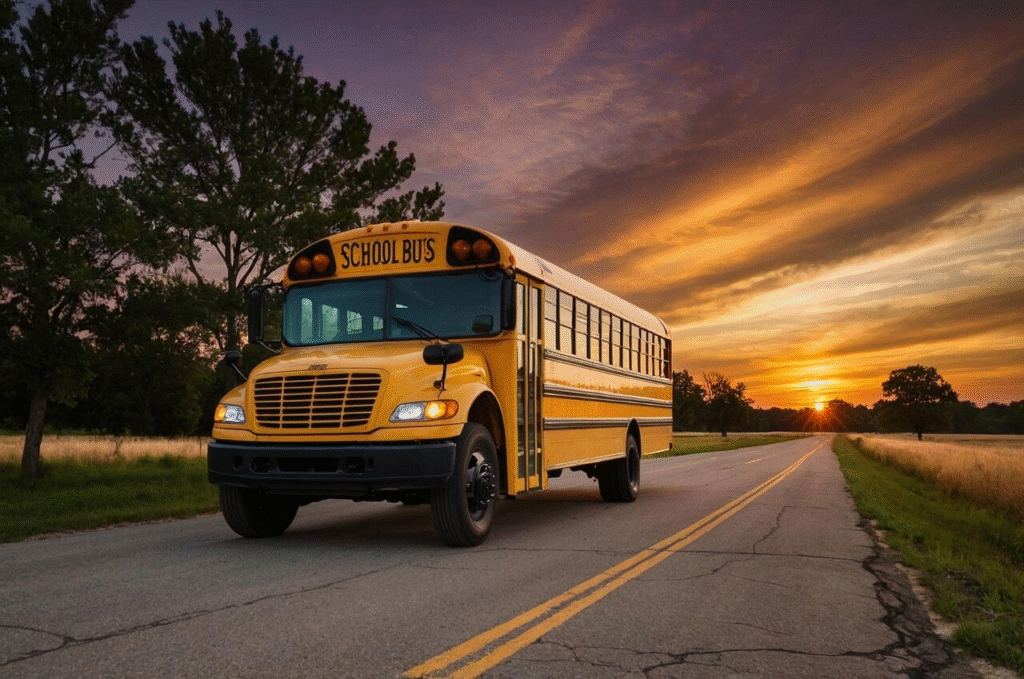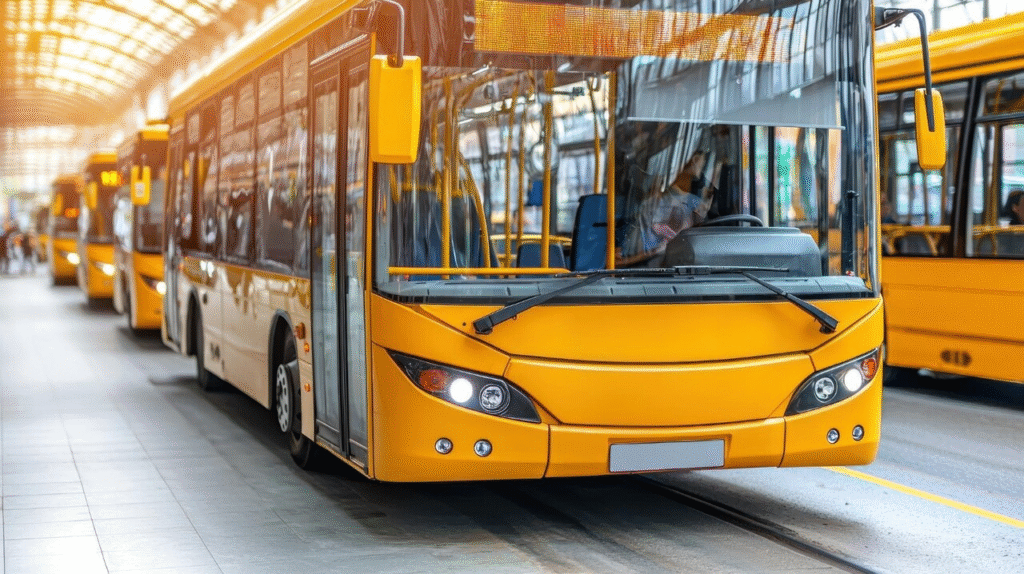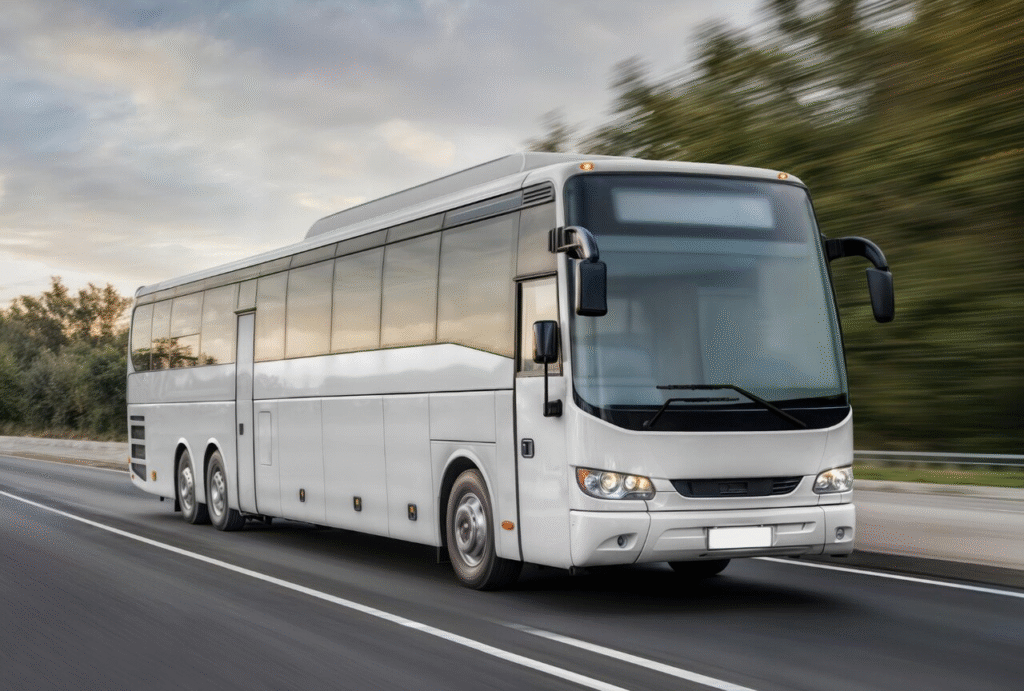When it comes to planning student transportation, whether for daily routes, field trips, or athletic events, choosing the right bus size is essential. University and school travel requires practical solutions for moving large groups efficiently, and larger buses offer the seating capacity, comfort, and reliability needed for a smooth experience. Understanding your options when it comes to bus sizes allows you to make informed, strategic decisions that align with your institution’s transportation needs.
Why Bus Size Matters
The size of a school bus affects more than just seating capacity. It also determines maneuverability, fuel efficiency, and suitability for certain routes or event types. Whether you’re organizing a school field trip, a camp, or a corporate event, the right bus size makes all the difference.
Types of School Bus Sizes
School buses come in a variety of capacities to suit different transportation needs. Here’s a general overview:
Mini Buses (10-30 Passengers)

Also known as: Type A or Type B school buses
Best For:
These compact buses are commonly used for special education programs, short-distance school routes, and travel in tight urban or residential areas where maneuverability is key. With their smaller size and practical design, mini buses offer a reliable option for schools looking to accommodate specific student needs without the scale of a full-size bus. They’re also more cost-effective to operate and easier to park, making them a smart solution for schools with limited space or budget.
Key Features:
Mini buses are typically built on a van or cutaway chassis, making them easier to maneuver and park, especially in narrow streets or crowded school zones. Many models are equipped with wheelchair lifts or ramp access, making them ideal for transporting special needs students with comfort and care. Their compact size also means they consume less fuel compared to larger school buses, helping schools reduce operational costs while staying eco-conscious.
Ideal Users:
Mini buses are a perfect fit for organizations that transport small groups regularly. They are commonly used by daycares, which require safe and accessible transportation for young children. Private schools also benefit from minibuses for shuttling students between campuses or to extracurricular activities.
Mid-Size Buses (30-50 Passengers)

Also known as: Type C, the most commonly used school bus model.
Best For:
These buses are ideal for medium-sized school districts that require efficient transportation for a moderate number of students. Their size and capacity make them well-suited for routes with frequent stops or split shifts, allowing schools to manage multiple routes with ease. They also perform well in rural areas with scattered pickup points, offering a balance between maneuverability and passenger capacity.
Key Features:
Mid-size buses typically feature a conventional front-engine design, which offers easy maintenance and reliable performance. They strike a balance between passenger capacity and mobility, making them versatile enough for both urban and rural routes. Compared to mini buses, mid-size models provide more onboard and under-seat storage space, which is especially useful for athletic equipment, backpacks, or field trip supplies.
Ideal Users:
Mid-size buses are an excellent choice for public and charter schools that need dependable, everyday student transportation. They’re also well-suited for sports teams or academic groups, offering the right mix of space and comfort for local and regional travel.
Full-Size Buses (50-60+ Passengers)

Also known as: Type D or Transit-Style school buses
Best For:
These buses are ideal for large school districts that need to move a high volume of students across extensive routes. Their size makes them perfect for high-density pickups, allowing schools to transport more students in a single trip and reduce the number of buses needed on the road. Full-size buses are especially effective for efficient one-trip student pickups, minimizing fuel use and improving route planning for districts with tight schedules and broad service areas.
Key Features:
Full-size school buses are built for performance and capacity, with engine placement options in the front, rear, or middle, depending on the model and district needs. They offer the highest seating capacity of all school bus types, making them ideal for transporting large groups efficiently. Engineered for durability and long-distance travel, these buses are a reliable choice for districts with expansive service areas.
Ideal Users:
Full-size buses are best suited for large public school systems that require high-capacity transportation daily. They’re also ideal for field trips involving multiple classes, offering enough seating to accommodate large groups in a single vehicle. Additionally, school districts aiming to reduce the number of buses on the road can benefit from the efficiency of full-size buses, which help consolidate routes and minimize operational costs without compromising on service quality.
School Bus Sizes: What To Consider
In this section, we cover the key factors to consider when deciding on the right size school bus for your school or district.
Number of Passengers
Think about your maximum number of riders, not just your daily average. Even students who usually get dropped off might need a ride if plans change. Larger schools often benefit from full-size Type C buses to cut down on routes, while smaller schools may find a minibus is all they need. Plan ahead so you’re always ready, even on your busiest days.
Accessibility That Scales
Larger buses can be a great option for accommodating both accessibility needs and high capacity. Many full-size models come with the space and layout flexibility to install wheelchair lifts and other ADA features, so you can serve all students without compromising on passenger count.
Plan with the Future in Mind
School buses often stay in service for over a decade, so think ahead, not just about your current needs, but where your school is headed. A minibus might work for now, but as enrollment grows, it could fall short. If you’re in a growing area or planning to expand, choosing a larger bus today can save you from needing to upgrade too soon.
Why Choose a 56-Passenger Bus?

At Brilliant Charters, we specialize in 56-passenger charter buses, a full-size solution ideal for:
- Entire classroom or grade-level field trips
- Athletic teams travel with equipment
- School district transportation needs
- University and college group transfers
Our buses come equipped with modern safety features, comfortable seating, and experienced drivers to make every ride secure and smooth.
Built for Safety and Comfort
Safety is non-negotiable, especially when transporting students. That’s why our 56-passenger buses are maintained to the highest standards. Plus, the spacious interiors and climate control systems help ensure that everyone travels in comfort, no matter the weather or distance.
Ride Smart with Brilliant Charters
Ready to simplify school transportation? Brilliant Charters offers 56-passenger buses that deliver comfort, capacity, and cost-efficiency for daily routes, field trips, sports events, and more. Our buses are well-maintained, spacious, and driven by professional, safety-trained drivers. Whether you’re planning ahead or need a quick solution, we’re here to help you every step of the way. Book your ride today or contact us to create a custom transportation plan that fits your school’s needs perfectly.








